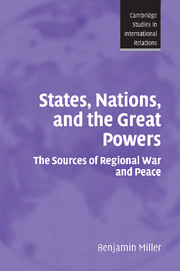Book contents
- Frontmatter
- Contents
- List of figures
- List of tables
- Preface and acknowledgments
- 1 Why some regions are peaceful and others are not
- 2 A theory of regional war and peace
- 3 States, nations, and war
- 4 Explaining the war proneness of the Middle East
- 5 The great powers war and peace in the Middle East
- 6 War and peace in the Balkans: states, nations, and great powers
- 7 The state-to-nation balance and the emergence of peace in South America during the twentieth century
- 8 The emergence of high-level peace in post-1945 Western Europe: nationalism, democracy, hegemony, and regional integration
- 9 Conclusions
- Appendix A Comparative dimensions of the state-to-nation imbalance in the Middle East, the Balkans, South America, and Western Europe in the post-1945 era
- Appendix B Data-file: major armed conflicts/wars by region, type, and modes of great power regional involvement (1945–2004)
- Bibliography
- Index
- Cambridge Studies in International Relations
9 - Conclusions
Published online by Cambridge University Press: 22 September 2009
- Frontmatter
- Contents
- List of figures
- List of tables
- Preface and acknowledgments
- 1 Why some regions are peaceful and others are not
- 2 A theory of regional war and peace
- 3 States, nations, and war
- 4 Explaining the war proneness of the Middle East
- 5 The great powers war and peace in the Middle East
- 6 War and peace in the Balkans: states, nations, and great powers
- 7 The state-to-nation balance and the emergence of peace in South America during the twentieth century
- 8 The emergence of high-level peace in post-1945 Western Europe: nationalism, democracy, hegemony, and regional integration
- 9 Conclusions
- Appendix A Comparative dimensions of the state-to-nation imbalance in the Middle East, the Balkans, South America, and Western Europe in the post-1945 era
- Appendix B Data-file: major armed conflicts/wars by region, type, and modes of great power regional involvement (1945–2004)
- Bibliography
- Index
- Cambridge Studies in International Relations
Summary
This concluding chapter has two main parts. The first part summarizes the main theoretical argument and some of the key findings. The second part examines the utility of competing peace strategies with regard to the resolution of the state-to-nation imbalance and suggests some policy-relevant recommendations. I explore the strategies, which are related to the logic of key IR theories, in accordance with the integrative model presented in the book.
Summary of the theory and findings
This book addresses two main puzzles on the regional level: (1) What best accounts for the transition from war to peace and vice versa in different regions at different times? (2) What is the best explanation for variations in the level of regional peace that exists in different regions in a particular time period? Consider, for example, the differences that exist today in the Middle East, South America, sub-Saharan Africa, East Asia, and Europe.
The book's response is that regional conflict outcomes are determined by two main factors: (1) the state-to-nation balance, the degree to which ethnic/national and political boundaries in a region are congruent as well as the extent of state strength, and (2) the form of great power involvement in the region. On the first variable, regions may be either balanced or imbalanced; on the second, I distinguish among four types of great power involvement: competition, cooperation, disengagement, and hegemony. In various combinations, these factors produce outcomes that include hot war, cold war, cold peace, normal peace, and high-level warm peace.
- Type
- Chapter
- Information
- States, Nations, and the Great PowersThe Sources of Regional War and Peace, pp. 369 - 421Publisher: Cambridge University PressPrint publication year: 2007



